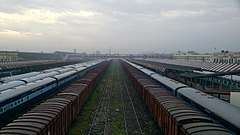Gorakhpur Junction railway station
The Gorakhpur Railway Station is located in the city of Gorakhpur in the Indian state of Uttar Pradesh. It has the world's longest railway platform.[1] It serves as the headquarters of the North Eastern Railway. The station offers Class A-1 railway station facilities.
Gorakhpur Junction Railway Station | |
|---|---|
| Indian Railway Station | |
 Indian Railways Logo | |
| Location | Gorakhpur, Uttar Pradesh India |
| Coordinates | 26.7598°N 83.3818°E |
| Elevation | 84 metres (276 ft) |
| Owned by | Indian Railways |
| Operated by | North Eastern Railway |
| Platforms | 10 |
| Tracks | 26 |
| Connections | Auto stand,Bus stand |
| Construction | |
| Structure type | Standard (on ground station) |
| Parking | Yes |
| Bicycle facilities | No |
| Other information | |
| Status | Opened |
| Station code | GKP |
| Zone(s) | North Eastern Railway |
| Division(s) | Lucknow Junction LJN division,Izzatnagar Division,Varanasi City Division |
| History | |
| Opened | 1930 |
| Electrified | Yes |
| Services | |
| |
| Location | |
 Gorakhpur Junction Location in Uttar Pradesh  Gorakhpur Junction Location in India | |
Gorakhpur Junction railway station is a major railway station in the state of Uttar Pradesh especially in the Purvanchal region (Eastern Uttar Pradesh) and it connects Eastern Uttar Pradesh to Bihar, Nepal and Northern India to Bihar.
History
The 135-mile (217 km) metre-gauge Gonda loop, running between Gorakhpur and Gonda, was constructed by the Bengal and North Western Railway between 1886 and 1905. The 79-mile (127 km) Kaptanganj–Siwan metre-gauge line was opened in 1913. The 25-mile (40 km) metre-gauge Nautanwa branch line was opened in 1925.[2]
Conversion to broad gauge started with the Gorakhpur–Siwan section in 1981. The Gorakhpur–Paniyahwa section was converted in 1991.[3] The Gorakhpur–Gonda loop was converted around 1985, and the Nautanwa branch line at about the same time. The Kaptanganj–Siwan line was converted around 2011 .[2]
Longest platform in the world
A remodeling of the Gorakhpur railway station was launched in 2009. The remodeling work was completed on war-footing within the scheduled time. With the inauguration of the remodeled yard on 6 October 2013, Gorakhpur has a platform measuring 1,366.33 metres (4,482.7 ft) with ramp and 1,355.40 metres (4,446.9 ft) without it.[1][4] At present, Gorakhpur has the world's longest railway platform, measuring 1,366m.[5]
Passenger movement
Gorakhpur is amongst the top hundred booking stations of Indian Railways.[6] It handles over 189 trains daily.[7] Some of the other railway stations in Uttar Pradesh handling large numbers of passengers are Kanpur Central,[8] Varanasi Junction,[9] Mathura Junction[10] and Mughalsarai.[11]
Gallery
 Gorakhpur Railway Station
Gorakhpur Railway Station
References
- "Gorakhpur gets world's largest railway platform". The Times of India, 7 October 2013. Retrieved 7 October 2013.
- "Indian Railways line history; 2. North Eastern Railway" (PDF). Retrieved 6 November 2012.
- "Varanasi Division at a Glance". North Eastern Railway. Retrieved 10 July 2013.
- "Gorakhpur railway station's remodelling in final stage". The Times of India. 2 June 2013. Retrieved 21 June 2013.
- Dinda, Archisman (9 October 2013). "Uttar Pradesh gets world's longest railway platform". GulfNews.com. Retrieved 9 October 2013.
- "Indian Railways Passenger Reservation Enquiry". Availability in trains for Top 100 Booking Stations of Indian Railways. IRFCA. Retrieved 21 June 2013.
- "Gorkhpur Jn (GKP)". India Rail Enquiry. Retrieved 9 July 2013.
- "Kanpur Central (CNB)". Indian Rail Enquiry. Retrieved 9 July 2013.
- "Varanasi Jn (BSB)". Indian Rail Enquiry.
- "Mathura". Indian Rail Enquiry. Retrieved 9 July 2013.
- "Mughalsarai Jn Railway Station (MGS)". Indian Rail Enquiry. Retrieved 19 June 2013.